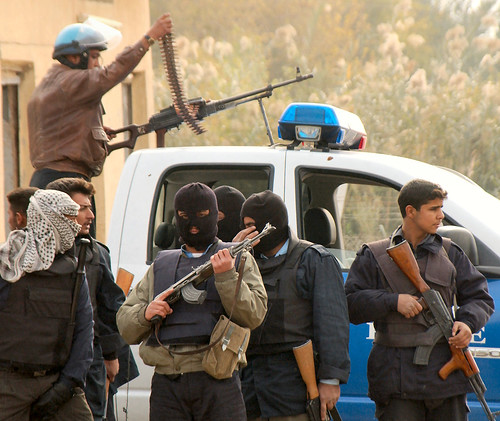Quality in Iraq Police, Not Quantity
On the cusp of recent news involving the increasing Iraqi Police dropout rate and more Iraqi police dead from insurgent attacks, the US Departments of State and Defense released an independent report yesterday on the current training progress. Their report points out the poor screening process used by coalition forces in accepting potential trainees and the lack of input from the Iraqis of what needs these new police officers must be trained to meet. In a nutshell, the report goes farther than criticizing the policies and procedures; it recommends an immediate overhaul of the current processes.
On the US Administration's insistence upon the numbers game, the report emphasizes the fallacy of this policy:
Coalition officials perceived a primary objective should be the fastest possible creation of a sizeable police force. To determine a force-strength target, planners reviewed per capita police-to-population ratios in neighboring Islamic countries. On this basis, 135,000 "trained and equipped" was considered to be the required number of Iraqi police (IP). The IIG agreed to this figure, and the IG Team accepts the logic of this methodology.Well, I applaud this report's gall in trying to gauge the success of the Iraqi effort. I only hope the Bush Administration will listen and act accordingly. Their track record of ignoring reality notwithstanding.
Nonetheless, aiming for numbers poses other issues. With the mix of IPs already on the force plus new recruits, it is hard to determine how many IPs are "trained and equipped." There are differing views on which units should be counted or how to validate the numbers against the goal of 135,000. Attrition and the failure to hire trainees (and/or trainees' decisions not to join the IPS) are additional factors that cloud the numbers' calculations. Coalition training subsequently has been driven by a focus on the numbers metric.
With a high IP casualty toll (over 1,600 policemen have lost their lives over the past year), widely publicized incidents in which the IP failed in the face of attacks, and skepticism among foreign observers, there is a perception that training programs have produced "cannon fodder" - numbers of nominal policemen incapable of defending themselves, let alone the Iraqi public.


0 Comments:
Post a Comment
<< Home